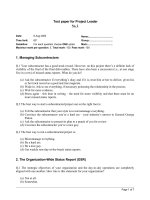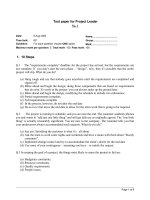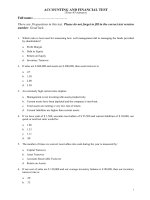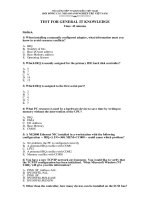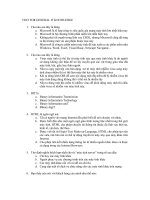test 12th
Bạn đang xem bản rút gọn của tài liệu. Xem và tải ngay bản đầy đủ của tài liệu tại đây (71.96 KB, 10 trang )
Name: English Test 12
th
Class: (Time allowed: 45 minutes)
I. Reading:
Read the following passage and choose the answer for each question:
British society is considered to be divided into three main groups of classes- the upper class, the
middle class, and the lower or working class. This is known as the class system and it is important to
know something about it, if you mean to understand British people and society. Most British people
grow up with a deep knowledge and understanding of the class system even if they are not very
conscious of it. As a result, more people know which class they belong to and are able to tell which
class other people come from by the way they speak, the kind of clothes they wear, their interests and
hobbies or even the type of food they eat.
Social class is not only about behaviour and attitudes. For example, although many upper-class
people are rich and many own a lot of land, having a lot of money doesn’t necessarily make a person
one member of the upper class. It is also important to come from a particular kind of family, have
friends who are considered suitable. There are people who are poor but they do not think of themselves
as working class because their family background, education, political opinions are basically different
from those of most working-class people. Many people do not like the class system but it is impossible
to pretend that these differences do not exist or that British people do not sometimes form opinions in
this way.
1. How many classes are there in Britain?
A. Two B. Three C. Four D. Five
2. According to the passage, you can not judge an Englishman’s social class by __________.
A. where he was born C. the clothes he wears
B. the way he speaks D. the interests he had
3. If an Englishman has much money, ___________.
A. he belongs to the middle class. C. he is not likely to be from the upper class
B. he must be a member of the upper class. D. he may buy his class by money
4. Why many people who are poor do not think themselves as working class?
A. Because their family background is different from one of the working class.
B. Because their education is different from one of the working class.
C. Because their political opinions are different from those of the working class.
D. All are correct.
5. What would be the best title for the passage?
A. A Society C. Social Class in Britain.
B. British People and Society D. Britain
II. Grammar and vocabulary:
• Choose the underlined part among A, B, C or D that needs correcting:
6. She suggested to spend our weekend camping and we all agreed.
A B C D
7. The workers reported the man who has already tried to break into the car to the police.
A B C D
8. They said that their son can play the piano for over three hours.
A B C D
9. Peter refused telling us the reason why he didn’t come to the class meeting last week.
A B C D
10. When I entered the room, I had found my young son standing on the kitchen table.
A B C D
• Choose the best option to complete the following sentences:
11. She often _______ her secrets with her father.
A. opens B. shares C. gives D. talks
12. I’m now in grade 12 at high school so I am _______ a lot of study pressure.
A. under B. in C. of D. with
13. English is a _______ easy language to learn.
A. compared B. comparable C. comparative D. comparatively
14. We ______ English for 6 years. So we think we are quite confident in using the language now.
A. are learning B. will learn C. have been learning D. will have learnt
15. He said he ______ return later.
A. will B. would C. would be D. can
16. Do you really ______ me to believe you?
A. expect B. think C. wait D. plan
17. I have been waiting for you ________
A. since early morning B. since 9 a.m C. for two hours D. all are correct
18. John _______ a book when I saw him.
A. is reading B. was reading C. reads D. read
19. The little girl asked what _______ at that moment.
A. I am doing B. was I doing B. I was doing D. am I doing
20. “What did you do last night?” “I watched TV, practised the piano, and ______ my homework”
A. did B. made C. worked D. wrote
21. You are responsible _______ what you have done before.
A. with B. about C. for D. at
22. Non-verbal ________ is considered a quite useful ways of socializing.
A. communicate B. communicating C. communicative D. communication
23. Don’t worry! By the time you arrive tomorrow, we ______ the work.
A. have finished B. will have finished C. will finish D. are finishing
24. Many Indian students agree that a woman has to _______ more in a marriage than a man.
A. sacrifice B. maintain C. suppose D. determine
25. The room is arranged very ________
A. attract B. attraction C. attractive D. attractively
26. When the girl came to the club, everybody ______ there.
A. was already leaving B. already left C. had already left D. are already leaving
27. “Your shirt colour is terrific!” “ _______. That’s a nice compliment.”
A. Thank you. B. You must be kidding C. Are you kidding D. I thought it was terrible
28. “It’s very kind of you to look after my dog when I was out.” said Sarah to her neighbour
A. Sarah thanked her neighbour for look after her dog when she was out.
B. Sarah thanked her neighbour for looking after her dog when she had been out.
C. Sarah asked her neighbour to look after her dog when she was out.
D. Sarah asked her neighbour for looking after her dog when she had been out.
29. A best friend is a person you can confide _______.
A. with B. at C. to D. in
III. Writing:
Rewrite the following sentences in such a way that it means exactly the same as the given one,
using the words suggested:
30. They have never visited their hometown before. => This the first time .............................................
31.“Never borrow money from friends” my father said. => My father advised .......................................
32. “Why don’t you complain to the company, John?” said Peter. => Peter suggested John ...................
....................................................................................................................................................................
33. “Please repeat what you have said, Tom” they said. =>They asked ...................................................
34. I last saw her two months ago. => I haven’t ........................................................................................
E. Phonetics:
• Choose the word whose underlined part is pronounced differently from the others:
35. A. mischievous B. romantic C. signal D. decide
36. A . viewed B. believed C. stopped D. learned
37. A. shops B. notes C. adds D. lets
• Choose the word whose stress pattern is different from the others:
38. A. refuse B. answer C. begin D. complain
39. A. about B. around C. between D. under
40. A. knowledge B. enjoy C. argue D. invite
Name: English Test 15 minutes
Class:
I. Phonetics:
• Choose the word whose underlined part is pronounced differently from the others:
1. a. compliment b. come c. communication d. observe
2. a. regret b. express c. prepare d. because
3. a. signal b. polite c. apologize d. slight
• Choose the word whose stress parttern is different from the others:
4. a. between b. mountain c. about d. enjoy
5. a. teacher b. sudden c. around d. narrow
II. Vocabulary and structures:
6. An article in the newspaper ________ my attention.
a. caught b. attracted c. got d. all are correct
7. I ______ to the same barber since last year.
a. am going b. have been going c. go d. had gone
8. After the race ________, the celebration began.
a. had been won b. is won c. will be won d. have been won
9. He said he _______ book when the robber broke into the house.
a. read b. was reading c. had read d. has been reading
10. Your car is too dirty. When did you have it _______?
a. wash b. be washed c. being washed d. washed
11. As you _______ your car at the moment, can I borrow it?
a. don’t use b. aren’t using c. haven’t used d. won’t use
12. Come and see me when you ________ your report.
a. finish b. finished c. will finish d. had finished
13. Susan _________ as a secretary for two years before her marriage.
a. worked b. has been working c. had worked d. was working
14. He said “I haven’t seen my cousin today”
a. He said he hasn’t seen his cousin that
day.
b. He said he hadn’t seen my cousin that
day.
c. He said he hadn’t seen his cousin that
day.
d. He said I hasn’t seen his cousin that day.
15. He asked me “When did you visit Buckingham?”
a. He asked me when I had visited
Buckingham.
b. He asked to me when I had been visited
Buckingham.
c. He asked me when had I visited
Buckingham.
d. He asked me when I did visited
Buckingham.
III. Writing: Turn these following sentences into reported speech:
16.“Ring me up tomorrow” he said to me.
...............................................................................................................
17.“I saw them at my parents’ house last year” Linda said to her mother.
...............................................................................................................
18.“Have you seen Jack in the classroom this morning?” she asked me.
..............................................................................................................
19.“Would you like to go somewhere for a change?” he said to us.
.............................................................................................................
20.“If I were you, I wouldn’t make the decision” he said to me.
............................................................................................................
Name: English Test 15 minutes
Class:
I. Writing: Turn these following sentences into reported speech:
1. “I saw them at my parents’ house last year” Linda said to her mother.
...............................................................................................................
2. “Ring me up tomorrow” he said to me.
...............................................................................................................
3. “Would you like to go somewhere for a change?” he said to us.
.............................................................................................................
4. “If I were you, I wouldn’t make the decision” he said to me.
............................................................................................................
5. “Have you seen Jack in the classroom this morning?” she asked me.
..............................................................................................................
II. Phonetics:
• Choose the word whose underlined part is pronounced differently from the others:
6. a. compliment b. come c. communication d. observe
7. a. regret b. express c. prepare d. because
8. a. signal b. polite c. apologize d. slight
• Choose the word whose stress parttern is different from the others:
9. a. between b. mountain c. about d. enjoy
10. a. teacher b. sudden c. around d. narrow
III. Vocabulary and structures:
11. An article in the newspaper ________ my attention.
a. caught b. attracted c. got d. all are correct
12. I ______ to the same barber since last year.
a. am going b. have been going c. go d. had gone
13. After the race ________, the celebration began.
a. had been won b. is won c. will be won d. have been won
14. He said he _______ book when the robber broke into the house.
a. read b. was reading c. had read d. has been reading
15. Your car is too dirty. When did you have it _______?
a. wash b. be washed c. being washed d. washed
16. As you _______ your car at the moment, can I borrow it?
a. don’t use b. aren’t using c. haven’t used d. won’t use
17. Come and see me when you ________ your report.
a. finish b. finished c. will finish d. had finished
18. Susan _________ as a secretary for two years before her marriage.
a. worked b. has been working c. had worked d. was working
19. He said “I haven’t seen my cousin today”
a. He said he hasn’t seen his cousin that
day.
b. He said he hadn’t seen my cousin that
day.
c. He said he hadn’t seen his cousin that
day.
d. He said I hasn’t seen his cousin that day.
20. He asked me “When did you visit Buckingham?”
a. He asked me when I had visited Buckingham. c. He asked me when had I visited Buckingham.
b. He asked to me when I had been visited
Buckingham.
d. He asked me when I did visited Buckingham.

